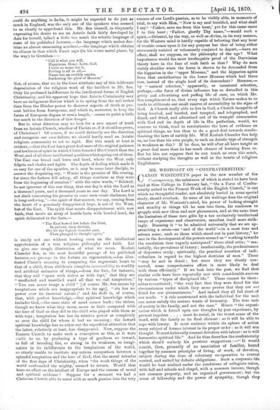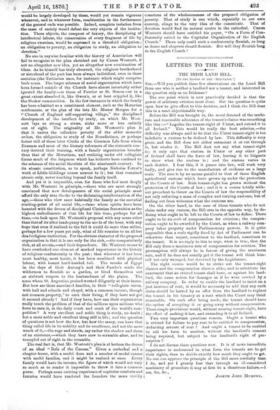MR. WESTCOrT ON "CONFRATERNITIES.'
CANON WESTCOTT'S paper in the new number of the Contemporary, the substance of which is stated to have been read at Sion College in February last, " On a Form of Confra- ternity suited to the Present Work of the English Church," is one which no thoughtful reader, not absolutely buried in some special study, should overlook. In none of his writings does the original character of Mr. 1Vestcott's mind, his power of looking straight and steadily at things till he sees into them, his readiness to grapple with new ideas and new phenomena, and at the same time the limitation of these rare gifts by a too exclusively intellectual range of experience and observation, manifest itself more strik- ingly. Deeming it " to be admitted universally that we are ap- proaching a crisis—an end of the world '—in a most tree and solemn sense, such as those which stand out in past history," he sees in the development of the powers around us " working towards the revolution thus vaguely anticipated" three chief evils; " ma- terially, the prevalence of luxury ; intellectually, the predominance of dispersive study ; spiritually, the practical assertion of indi- vidualism in regard to the highest destinies of man." These " may be met in detail ; but since they are closely con- nected, some comprehensive effort is more likely to deal with them efficiently." If we look into the past, we find that similar evils have been repeatedly met with considerable success by various " types of disciplined life." These cannot be them- selves resuscitated ; "the very fact that they were fitted for the circumstances under which they arose proves that they are no t fitted for our circumstances." And indeed they all fall short of our needs. " A rule constructed with the individual for the unit can never satisfy the mature wants of humanity. The true unit of society is the family, and not the man." Hence " the organi- zation which is forced upon our thoughts by past experience, by present impulses . . . . must be social, in the truest sense of the word, with the family as its final element : so it will be able to cope with luxury. It must embrace within its sphere of action every subject of human interest in its proper order : so it will win thought. It must habitually connect devotion with labour: so it will harmonize spiritual life." And he thus describes the confraternity which should embody his previous suggestions :—" It would consist, then, primarily of an association of families, bound together by common principles of living, of work, of devotion, subject during the time of voluntary co-operation to central control, and united by definite obligations. Such a corporate life would be best realized under the conditions of collegiate union, with ball and schools and chapel, with a common income, though not common property, and an organized government ; but the sense of fellowship and the power of sympathy, though they
would be largely developed by these, would yet remain vigorous whenever, and in whatever form, combination in the furtherance of the general ends was possible. Indeed, complete isolation from the mass of society would defeat the very objects of the institu- tion. These objects, the conquest of luxury, the disciplining of intellectual labour, the consecration of every fragment of life by religious exercises, would be expressed in a threefold obligation ; an obligation to poverty, an obligation to study, an obligation to devotion."
No one in anywise familiar with the history of Association will fail to recognize in the plan sketched oat by Canon Westcott, if not an altogether new idea, yet an altogether new combination of ideas. As he himself has truly observed, the religious brotherhood or sisterhood of the past has been always individual, even in those societies (the Tertiarian ones, for instance) which might comprise both sexes. The larger schemes of social organization which have been formed outside of the Church have almost invariably either ignored the family—as those of Fourier or St. Simon—or to a great extent absorbed it, like Owen's, or at best crippled it, like the Shaker communities. In the few instances in which the family has been admitted as a constituent element, such as the Moravian -settlements, or the plan of the late Mr. Minter Morgan for a ." Church of England self-supporting village," the disciplined development of the intellect by study, on which Mr. West- cott lays so strong a stress, sinks more or less entirely out of sight. The originality of Mr. Westcott's plan is that it unites the collective poverty of the older monastic -orders, the obligation to study of the Benedictines, or perhaps better still of those later Clerks of the Common Life from whom Erasmus and most of the literary reformers of the sixteenth cen- tury derived their training, with a family organization broader than that of the Moravian, and realizing under old collegiate 'forms much of the largeness which has hitherto been confined to the schemes of the social theorists of the nineteenth century. In its atomic constitution, so to speak, perhaps Nicholas Ferrar's work at Little Giddings comes nearest to it; but that remained -atomic only, never reaching beyond the family itself.
Aud yet it is impossible, even for those who feel most deeply with Mr. Westeott in principle,—those who are most strongly -convinced that new developments of the social principle must afford the only true checks to the dislocating intellectualism of the age,—those who view most habitually the family as the essential -starting-point of all social life,—those whose spirits have been haunted with the dream of disciplined Christian fraternities as the -highest embodiments of that life for this time, perhaps for all time,—to look upon Mr. Westcott's proposal with any sense other than that of its utter inadequacy to the needs of the hour, with any thope that even if realized to the full it could do more than utilize, perhaps for a few years yet only, what of life remains to an all but -dead religious institution. For the obvious character of the proposed -organization is that it is one only for the rich,—the comparatively rich, at all events,—and their dependents. Mr. Westcott seems to have overlooked one element of marked importance in the history -of religious confraternity in the past ; that wherever it has been most healthy, most heroic, it has been combined with physical labour, with honest hard-handed toil. The monks of Egypt in the days of their Antony's and their Pambo's made the wilderness to flourish as a garden, or hired themselves out -as stalwart reapers to the husbandman of the plains. The -nuns whom St. Augustine praised worked diligently at their looms. But how are these associated families, in their "collegiate union, with hall and schools and chapel, with a common income, though slot common property," to earn their living, if they have not got it secured already ? And if they have, how can their organization -really touch the problem of that of the millions upon millions who have to earn it, in the daily crush and crash of the world's com- petition ? A very excellent and noble thing is study, no doubt ; but a more noble and excellent thing still is life ; and the question of questions is not how the few, but how the many, can have that thing called life in its nobility and its excellence, and not the mere wreck of it,—the rags and shreds, say rather the shadow and sham of an existence,—which they have now to scramble after, and be trampled out of sight in the scramble.
The real fact is, that Mr. Westcott's plan is at bottom the dream of an ideal " Rule of the Canons." Given a cathedral and a chapter-house, with a model dean and a number of model canons with model families, and it might be realized at once. Every family would have its income, the figure of which would not vary so much as to render it impossible to throw it into a common parse. Perhaps some existing experience of capitular comforts and luxuries would have rendered the founders the more vividly conscious of the wholesomeness of the proposed obligation of poverty. That of study is one which, especially in our own country, clings to the very idea of the canonicate. That of devotion would find its natural centre in the cathedral. Canon Westcott should have entitled his paper, " On a Form of Con- fraternity suited to the Capitular Organization of the English Church." There only could such a confraternity flourish, so long as deans and chapters should flourish. But will they flourish long in the English Church?































 Previous page
Previous page